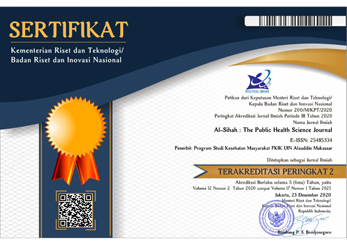Social Stigma, Family Support, and Healthcare Access as Determinants of Substance Use Among Transgender Populations
A Quantitative Study in South Sulawesi, Indonesia
DOI:
https://doi.org/10.24252/al-sihah.v17i1.55863Keywords:
family support, health services, substanse abuse, social stigma, transgender peopleAbstract
Substance abuse among transgender individuals remains underexplored, particularly in the context of how intersecting social determinants contribute to its prevalence. Existing studies often overlook the paradox wherein increased healthcare access does not equate to effective support due to systemic bias and exclusion in service provision. This study aims to analyze the influence of social stigma, family support, and healthcare access on drug abuse among transgender individuals in South Sulawesi. A cross-sectional quantitative study was conducted involving 230 transgender individuals in South Sulawesi, including 178 residing in Makassar. Data were collected through structured interviews and validated questionnaires, and then analyzed using descriptive statistics and logistic regression. The findings indicate that social stigma is a significant risk factor linked to an increased likelihood of substance use (p < 0.05), whereas family support shows a protective association, potentially mitigating the risk of substance use within this population. However, greater access to healthcare services is associated with higher chances of substance use, indicating challenges in the effectiveness of rehabilitation services for transgender individuals, particularly due to persistent stigma, lack of provider training in gender-sensitive care, and limited inclusivity within existing healthcare systems.These findings highlight the need for a holistic intervention framework that prioritizes stigma reduction, social support, and inclusive healthcare access, particularly within marginalized and rural health systems. The evidence may guide policies aimed at enhancing equity and responsiveness in service delivery for underserved populations.
Downloads
References
Adler, N. E., Epel, E. S., Castellazzo, G., & Ickovics, J. R. (2000). Relationship of subjective and objective social status with psychological and physiological functioning: Preliminary data in healthy, White women. Health Psychology, 19(6), 586–592. https://doi.org/10.1037/0278-6133.19.6.586
Arrington-Sanders, R., Alvarenga, A., Galai, N., Arscott, J., Wirtz, A., Carr, R., & Celentano, D. (2022). Social determinants of transactional sex in a sample of young Black and Latinx sexual minority cisgender men and transgender women. Journal of Adolescent Health, 70(2), 275-281. https://doi.org/10.1016/j.jadohealth.2021.08.002

Downloads
Published
How to Cite
Issue
Section
License
Copyright (c) 2025 Muhammad Azwar, Lilis Widiastuty, Wirawan Setialaksana

This work is licensed under a Creative Commons Attribution-NonCommercial-ShareAlike 4.0 International License.
Authors retain copyright and grant the journal right of first publication with the work simultaneously licensed under a Creative Commons Attribution-NonCommercial-ShareAlike 4.0 International License that allows others to share the work with an acknowledgment of the work's authorship and initial publication in this journal.
Authors are able to enter into separate, additional contractual arrangements for the non-exclusive distribution of the journal's published version of the work (e.g., post it to an institutional repository or publish it in a book), with an acknowledgment of its initial publication in this journal.
Authors are permitted to publish their work online in third parties as it can lead to wider dissemination of the work.













